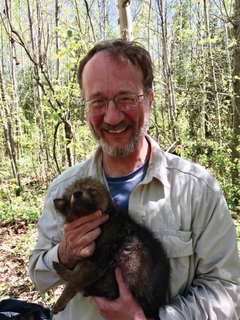- Issue:
Arlo Frost, '87 DVM, finds that an enjoyable diversion from veterinary medicine is... more veterinary medicine.
Frost volunteers with the Student Initiative for Reservation Veterinary Services (SIRVS), a University of Minnesota student-led volunteer organization that provides veterinary services to Native American communities in Minnesota.
“I get to help the local community, but I’m also helping the students get experience they might not otherwise get,” says Frost. “It’s fun to do that.”
Frost graduated from Dartmouth College in Hanover, N.H., and came to Minnesota, where he could pursue a degree in veterinary medicine while his wife, a Smith College graduate with a business degree from Duke University, could explore a range of job options. “When I came out here, I had no intention of staying,” he says. “Now I love it.”
After graduating in 1987, Frost spent years working for other clinics before “concluding that the only acceptable thing was to have a practice of [his] own.” That year, he started Silver Lake Animal Hospital, a small-animal clinic in Oakdale, Minn.
Frost refers many patients requiring 24- hour or specialized care to the University of Minnesota Small Animal Hospital. Says Frost, “I feel that the University is a valuable referral resource, and I feel that the mission of educating the next generation of veterinarians should be supported.”
In 2013, Frost was invited to a Student Initiative for Reservation Veterinary Services (SIRVS) event by his son, then a CVM student and president of the student-led volunteer organization. SIRVS conducts clinics (usually lasting anywhere between two days to a week) in several communities, including White Earth Nation, Leech Lake Band of Ojibwe, Mille Lacs Band of Ojibwe, and Lower Sioux Indian Community. After Frost’s son graduated, Frost says the incoming president asked him if he would continue attending the clinics.
“People living on the reservation like animals and want to have pets,” says Frost. “Their pets tend to be very well cared for—it’s just that the owners are not always in a position to pay for a spay or neuter.”
Student volunteers work with local partners to schedule clinics, which are usually held in community centers. They also apply for grants and perform limited fundraising to keep the clinics going. Faculty advisor Larissa Minicucci, DVM, MPH, DACVPM, associate professor in the College of Veterinary Medicine, attends most events along with volunteer veterinarians, who help guide students through performing examinations, surgeries, and other clinical tasks.
“I will scrub in for surgery and, depending on the student’s ability and confidence, either I watch and guide them with the surgery, or in some cases I take over,” Frost says. He also often invites members of his clinic to help. At his last outing, he was accompanied by three technicians and a veterinarian from Silver Lake.
Students running SIRVS are always seeking both financial support and volunteers, since their services are in high demand and they benefit academically and professionally from the experience. SIRVS performs five or six clinics each year. While there are requests to conduct more clinics, the student organization is somewhat limited by student schedules. However, SIRVS sees more than 600 animals each year, completed more than 150 spay and neuter surgeries in 2017-18.
Five years and 20 SIRVS clinics later, Frost continues to be amazed by the efforts of the organization’s student volunteers. “It’s something that’s almost solely driven by the students, which to me is very commendable,” says Frost. “They’re doing really good work, so it needs to be supported.”
Photo courtesy of Arlo Frost

